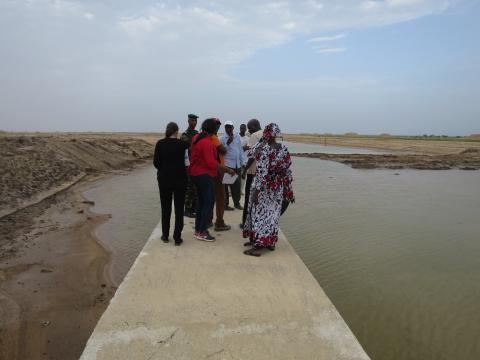
Throughout September 2019, an IDEV team carried out a series of field missions across four countries - Morocco, Mozambique, Rwanda and Senegal - as part of its ongoing evaluation of mainstreaming green growth and climate change into the Bank’s policies and operations. The purpose of the evaluation is to help the Bank contribute to development effectiveness in these areas.
The mission team, which included Mabarakissa Diomande, Senior Evaluation Officer, Benjamin Camara, Junior Consultant, and Rita Effah, Young Professional, was joined in each country by two consultants from LTS consulting, the firm hired to help carry out the independent evaluation. The transition to green growth, low-carbon and climate resilient development in the continent is a primary objective of the Bank's Ten-Year Strategy (TYS: 2013-2022). Through its second Climate Change Action Plan (2016-2020) the Bank aims to allocate 40% of its investments to climate finance. It also expects all proposed projects’ designs to be informed by climate change and green growth; parity between climate adaptation and mitigation finance; and to scale up Africa's current share of global climate finance. Reflecting its commitment to combatting climate change, the Bank continued its campaign to present the continent’s case at the COP25 in Madrid, Spain, on 2 December 2019.

The four country field missions are a crucial part of IDEV’s evaluation. The team collected qualitative and quantitative data centered around two main questions: “How well has the Bank integrated green growth and climate change initiatives into its interventions (policies, strategies, tools and projects)?” and “How well did the projects related to green growth and climate change perform?”. Prior to the mission, the team conducted a portfolio review of 1,528 Bank Group interventions between 2008 and 2018, focusing on the 675 that had significant green growth and climate change components. They then selected 16 projects for field visits. These projects mainly concerned agriculture and rural development, environment, transport, energy, and water. The team visited 26 towns and villages, travelling more than 1500 miles by road to talk directly to 218 beneficiaries, country office staff members, government officials and other stakeholders. The team also collected 128 documents in the countries. As a result of this field mission, IDEV will prepare country case studies of the four countries visited.
“Sometimes the only way you can truly understand the results of an intervention is to speak to the people it has affected, to the stakeholders on the ground. This is what makes these field visits crucial to conducting a comprehensive evaluation” said the evaluation task manager, Mabarakissa Diomande.
The evaluation will report to the Board of Directors and other stakeholders on the Bank’s performance in mainstreaming green growth and climate change into its policies and operations. It will also promote learning by providing lessons learned, good practices and recommendations to assist Bank Management and operations staff in improving the quality and performance of its green growth and climate change interventions.
The final summary report of the evaluation will be submitted to the Committee on Operations and Development Effectiveness of the Bank's Board of Directors in the first quarter of 2020.

